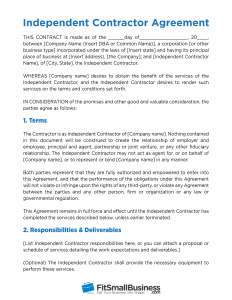An independent contractor agreement is a legal document between a company and an independent contractor, freelancer or subcontractor. It’s an all-encompassing document that outlines the specifics of the work to be done, terms of the arrangement, deliverables, reimbursement and any additional clauses.
In this article, we will supply you with a completely free independent contractor agreement template to customize and download. We will also share information on what to include and what to leave out if you’re employed as a 1099 contractor or employing yourself.
Disclaimer: FitSmallBusiness provides education and information and does not serve as a licensed attorney. Before finalizing contract language, have your attorney review the arrangement and make adjustments required by your condition, local or industry practice.
Independent Contractor Agreement Template

Here is an independent contractor agreement template that contains contract language beneficial to both your company and to the individual contractor you hire. It can be used by businesses looking for independent contractors and the subcontractors, solopreneurs or freelancers working for them.
Based on which side of this contract you are on, you may come across some of the advice less important to you. But simply to keep things honest, we’ve included sections that benefit both employer and contractor.
- Download Independent Contractor Agreement Template as a PDF or DOC
Things to Include in an Independent Contractor Agreement
All contracts between employer and contractor must include basic information, including contract provisions, a detailed description of the job to be done, payment info, confidentiality agreements and even documentation on how to solve issues should a disagreement occur. In addition, contracts must be signed by both parties.
However, if you are employing a full-time executive or you’re hiring an employee and intend to pay them hourly salary or a salary you should use a employment contract form instead.
Terms
The conditions of the arrangement include the names of the business and subcontractor, work place, date of the contract, and a high-level description of this project with details of the job to be performed.
Duties & Deliverables
Responsibilities and deliverables for an independent contractor include what function they will do or what deliverables (goods and/or services) they’ll provide. Examples may vary from”installing a chain link fence with locking gate around the business parking lot” to”building an SEO-friendly site with 300 pages of articles and an e-commerce function.”
Be specific enough that it’s clear what needs to be achieved but not so particular it takes up more than just a few paragraphs — unless it’s a massive project with countless landmarks like building an e-commerce site. In that situation, you’d want to attach the original bid proposal or statement of work.
Compensation & Payment Criteria
Provide reimbursement information and include how and if the contractor will be compensated. A best practice is not to pay an hourly fee but rather a predetermined rate for completion of the project with payments made in particular milestones.
Employing the fence example above, perhaps offer 25% payment when licenses are received and utilities marked, 25 percent after post holes have been laid out and dug, 25% when fencing material is up and the remaining 25% upon successful completion with a locking gate.
Confidentiality & Noncompete Agreements
These additional arrangements typically benefit the company by protecting proprietary data and client data. Since many countries, like California, have restrictions around these documents refer to our posts on the best way to create a nondisclosure agreement and noncompete agreements.
Based on the kind of contract and work, a freelancer may also desire to protect her or his intellectual property, making sure it is only used for the purpose intended and not resold by the business for gain. By way of instance, if you commission an artist to paint a customized painting, the artist may not desire you to make prints of the artwork to market.
Severability
This section should clarify the terms under which contract termination is acceptable. For instance, maybe the freelancer would like 30 days notice (or equivalent compensation) when they are terminated prior to the project ending. Maybe the company would like to get a termination clause which says if the independent contractor stops before completing the job, it will result in a $1,000 penalty from the contractor as they may suffer time delays while trying to find a replacement.
Integration
Integration is a fancy method of stating that if a single section of the independent contractor agreement is not valid, the remainder still is. We have provided sample speech in our template over.
Selection of Law
This section explains the state laws under which the contract ought to be enforced. It’s typically the location where the job is being done but, in the case of a business with offices in a certain state, they might prefer to write the contract subject to the laws of this country where the business is headquartered instead of the state where the job has been done.
Additional Alternatives
There are a number of extra options you might want to have in your independent contractor agreement, based upon your particular needs and circumstances.
Insurance Requirements
Many times, a business will require a subcontractor to maintain insurance coverage for vehicles and liability while they do work in the company location. If the subcontractor also has workers, additional insurance, such as worker’s compensation, is demanded.
The subcontractor, that should have his or her own insurance, can obtain a certificate of insurance by a company insurance agent. You might want to ask this within the contract.
Nonperformance Clause
An employer often has jobs stacked on a timeline. If one subcontractor fails to complete work to standards or punctually, it can throw the whole project off schedule. The nonperformance clause will help stop that.
By way of example, let’s say you hire a contractor to build your shoe store showroom in time for your grand opening next March. You might want a clause that says”failure to complete the showroom at the end of February as agreed will result in a 20 percent reduction in the overall payment.”
What Not to Include in an Independent Contractor Agreement
Here are two sections to omit from your contract to stop possible litigation problems.
Payment Schedule
In most cases, payments should be tied to deliverables or milestones, to not dates. That way you are not obligated to pay a fixed speed next month when nothing has done between then and now. Thus, having deliverables spelled out is a much better way to handle obligations than a payment schedule based on customs.
Employment Guarantee
Because unforeseen circumstances come up, both parties ought to have the choice to terminate the contract. Possibly a business does not receive the funding it anticipated and can’t finish the job? Suppose the contractor develops an illness. It is best to have no guarantee of employment or continuation. If that were an employment contract for a W-2 or 1099 worker, you’d need the at-will clause to use, stating that either party is free to exit the connection for no cause.
If You’re an Independent Contractor
An independent 1099 contractor might want additional clauses added to your contract to make sure he or she’s treated fairly. This is particularly important when the firm hiring the independent contractor is large as independent contractors will not have a lot of electricity once work has started. Independent contractors will need to be very particular about things like how approvals will be done and how disputes will be handled.
Deliverable Review & Approval Procedure
For independent contractors to safeguard themselves, they ought to contain instructions in the contract to explain when and how deliverables should be reviewed and accepted. By way of example, an independent contractor building an online training program would not want to wait 45 days for approval of a movie clip while the company owner is traveling for company.
This section should say something like,”deliverables submitted for acceptance are to be assessed with adjustments or reviewed and approved within 72 hours of completion so that the job can remain on track.”
Dispute Resolution
In this part, describe how you want disputes solved. Many individuals decide to utilize arbitration rather than having contract conflicts involve attorneys and expensive court costs, particularly when you’re an independent contractor operating with a sizable, well-lawyered small business.
Bottom Line
An independent contract arrangement could protect you from paying for a contractor’s services and getting little in return. Similarly, it protects contractors with a written document so they can be paid for the job they do. Its main advantage is that it clarifies who does what and who pays for it. This alone may prevent disagreements and false expectations so both contractor and business can stay focused on the work.
Before finalizing your arrangement, consider low-cost consulting with Rocket Lawyer.
Rocket Lawyer

